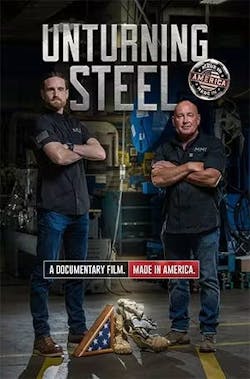Podcast: Transitioning Veterans From the Military to Manufacturing
Bill Leahy is the Chief Executive Officer at Renaissance Reliability, a veteran-owned and operated reliability and maintainability engineering consultancy dedicated to American manufacturers. Paul Lavoie is the Chief Manufacturing Officer at the State of Connecticut and is committed to helping manufacturers take advantage of market opportunities to grow their businesses and solidify Connecticut’s reputation as the Silicon Valley of advanced manufacturing.
The two worked closely on Unturning Steel, a documentary that helps provide service members with a path forward after returning home. In the film, Bill sets out on a hero’s journey to help his fellow veterans bring their talents to American manufacturing. Together with the University of Tennessee-Knoxville, Bill has created a new offering that provides veterans the support and training they need to find purpose in American manufacturing.
Bill and Paul recently spoke with Plant Services editor in chief Thomas Wilk about their work with veterans and how their initiatives are helping to close the skills gap in manufacturing in North America.
Below is an excerpt from the podcast:
PS: Bill, we'll start with you. Since the last time we talked, tell us a little bit about how we got from there to here – there being last year, a movie in mind but nothing in place, and to here being we've got something to show this year at the Marcon conference coming up.
BL: I'll give the abbreviated version of this because it could take a while and I'll start with the tragedy that spurred us on this journey. In December 2022, my brother Major Sean Patrick Leahy, U.S. Marine Corps committed suicide during his transition out of service while working in manufacturing. That event had a profound effect on me, my family, the factory Sean was working at, and we made a determination that we needed to do something about it.
Unturning Steel was born from that and we actually worked with Medalcraft Mint, which is where Sean was working, to launch the project. The essence of it is we are taking service members before they start their transition out of the military, we bring them into manufacturing, train them, inculcate them, do everything to prepare them for a successful career in manufacturing from start to finish at no cost to them. And what we really want to do is set the conditions for success so that the three things we recognize that veterans need when they transition – community, certainty, and purpose – through our program, we're going to give them all three.
PS: That's a great recap and summary of what we talked about on the last podcast, and I'll put the previous episode links in the podcast notes for everyone. Let me turn to Paul though. Paul, this is our first time meeting and talking. Tell us a little bit about yourself and your work with the State of Connecticut, and especially how you found Bill out there and began working on the project with him.
PL: Sure Tom, I am Connecticut's chief manufacturing officer. I am appointed by the governor, so Governor Ned Lamont appointed me to this role in February of 2022, and I'm part of the executive branch of government here in Connecticut.
Connecticut is the only state that has this role. And my job is to identify some of the key challenges in the manufacturing sector, and then to be able to work using all of the state’s assets to help deliver solutions to those challenges. Of course, we all know all across America, but certainly in Connecticut as well, the lack of an available and skilled workforce is the number one issue. 86% of the manufacturers in Connecticut cite that as the number one issue that's preventing them from growing. So my job is to figure out how we're going to solve that problem.
When I look at that, I look at underserved communities, people who aren't typically in manufacturing jobs but would easily transition into those jobs. And specifically I'm looking at four areas: women, second chance reentry people, neurodiverse people, and military veterans. I had read an article about Bill and the work that he was doing, certainly as he was motivated by the horrible tragedy with his brother, and it struck a chord with me. I hunted him down and reached out to him, and when he came back to Connecticut, we sat down. Clearly, what Bill wants to do lines up perfectly with what I'm doing here at the state level.
And I'm a huge collaborator. Bill will tell you he's got a couple of contacts with some people that run manufacturing businesses. There's a banker who's a veteran that's interested in getting folks into manufacturing as well. We're in the process right now of just really building this consortium that's going to help manufacturers solve their challenge by making sure that they have the availability of veterans to transition right into the workforce. And again, Bill is spot-on with the three things that they need and we can provide. The State of Connecticut can work with folks like Bill to help provide what our military veterans are looking for as they transition into the private sector.
Thomas Wilk | Editor-in-Chief
Thomas Wilk joined Plant Services as editor-in-chief in 2014. Previously, Wilk was a content strategist/mobile media manager at Panduit. Prior to Panduit, Tom was lead editor for Battelle Memorial Institute's Environmental Restoration team and taught business and technical writing at Ohio State University for eight years. Tom holds a BA from the University of Illinois and an MA from Ohio State University.
About the Author
Tom Wilk
Editor in Chief, Plant Services – Endeavor Business Media
Tom Wilk is the Editor in Chief of Plant Services, an Endeavor Business Media partner site.
Previously, Tom was a Technical Writer and a Social Media Manager for Panduit as well as a Senior Technical Editor for Battelle Memorial Institute.


